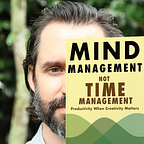Productivity is Limited. Creativity is Infinite.
There’s a difference between traditional productivity and creative productivity. Traditional productivity is limited. Creative productivity is infinite.
Start with the metaphor of stacking bricks. You can only stack bricks so fast. You can come up with new ways of getting the bricks ready, or new ways of laying down the mortar, but ultimately you have to put those bricks down, one at a time.
Time passes while you lay down those bricks. There’s only so much time in a day. There are only so many bricks you can lay.
Now take something like writing a book. A book is not just a collection of words. If you sat and typed random words as fast as you could, you would eventually end up with enough words to fill an average-sized book. But your “book” wouldn’t sell.
But if you arrange the words correctly, you can make an almost limitless impact. Consider that Pride and Prejudice has sold over 20 million copies over the past 200 years.
It’s possible to imagine a book doing even better. In fact, many books have. A Tale of Two Cities has sold 200 million copies over the past 150 years.
Copies sold is only one metric by which to measure an idea, but in many ways, the sky is the limit in creativity.
You can’t write a book without laying down the words, one-by-one, as if they were bricks. Yet laying down words does not make a book. The choice of words that you lay down drastically affects the performance of that book.
Traditional productivity is limited. Creative productivity is infinite.
It takes no time to have an idea. Creative insights happen in a “flash,” or a “spark.” It takes a collection of these insights, along with laying down words, to make a book. The quality of those insights dictates the success of the book.
But how can you have quality ideas that have an impact? How can you have those ideas over and over, consistently—enough ideas to write a whole book, or a dozen books?
Creative insights are seemingly random. They can happen at any time. It’s a cliché to have an idea in the shower. Archimedes had his fabled eureka! moment while taking a bath. Penicillin and vulcanized rubber were accidental discoveries. The melody of “Yesterday” came to Sir Paul McCartney in a dream.
We don’t believe Zeus causes lightning. We no longer blame earthquakes on Poseidon. Yet you still hear artists talk in earnest about The Muse—thousands of years after the conception of The Muses.
We may not know everything about creativity, but we know more than ever. Creative insights follow a predictable progression, traveling through stages. Periods of rest improve creative problem solving. Creative energy ebbs and flows.
These characteristics of creativity are at odds with traditional productivity. Mental rest isn’t likely to improve your brick-laying by a factor of two, yet mental rest could improve the quality of your idea by a factor of a thousand.
Yes, a deadline can spring creative thought into action, but it can also curb creativity.
Productivity is limited, and creativity is infinite. The methods we use to manage our traditional productivity can be useful in boosting our creative productivity, but only to a point. We need to think about creative productivity from the ground-up.
I quadrupled my creative productivity. Sign up and I’ll send you the tools I count on »
